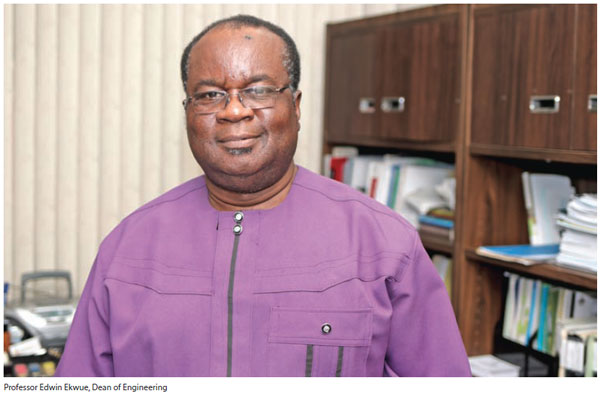
 On August 1, 2018, Professor Edwin Ekwue was appointed Dean of the Faculty of Engineering at UWI, St Augustine. It’s a critical appointment at a critical time. Since its establishment in 1961, the St Augustine Campus’ Engineering Faculty has produced generations of engineers, research and policy ideas that have helped shape the destiny of the Caribbean. On August 1, 2018, Professor Edwin Ekwue was appointed Dean of the Faculty of Engineering at UWI, St Augustine. It’s a critical appointment at a critical time. Since its establishment in 1961, the St Augustine Campus’ Engineering Faculty has produced generations of engineers, research and policy ideas that have helped shape the destiny of the Caribbean.
Today the Faculty is needed more than ever. Persistent economic challenges, crime, climate change, food security – the list of challenges facing the region is daunting. And as the premier Caribbean institution for tertiary education, UWI is one of the best resources for dealing with them. The Faculty of Engineering is an important tool in its arsenal.
“Engineering is very versatile,” says Professor Ekwue. “You can create enduring structures like skyscrapers. If there is an erosion problem, you can solve it. If there is a food problem, you can develop systems to produce more food.”
When asked if he is deterred by the challenges of his new position, the Dean smiles confidently and says: “I know the job has a lot of challenges, but having a lot of experience within the system, I know that I am prepared for the challenges.”
Ekwue, a professor of biosystems (agricultural) engineering, certainly has the experience. He has worked at St Augustine for more than 26 years, starting in 1992 as a lecturer in the Department of Mechanical and Manufacturing Engineering. As a researcher in the area of soil and water resources engineering, he has made major contribution in scientific inquiry and knowledge. He has written or contributed to more than 100 academic papers. As a teacher he has educated thousands of students and supervised more than 150 undergraduate projects. And as an administrator he has been representing the Faculty in various senior positions for over 15 years.
“My personal maxim is: ‘Anything I want to do, I do it and do it very well’,” Ekwue says.
It is an outlook he attributes to his parents and teachers in his home country of Nigeria. Ekwue is the fourth of eight children, four boys and four girls. Most of them are academics. Four of them have PhDs. All of them are high achievers. Growing up in the agricultural region of eastern Nigeria, he had the strengthening influence of life on a farm and parents who were both teachers, at a time when the Nigerian government was making major investments in the education of its youth.
“From age two or three we were taken to the farm,” he recalls. “I was also very good at mathematics. So I said I would become an engineer. The question was what kind of engineering I should do.”
Agricultural engineering was the obvious choice. So he embarked on his academic career. And it was while pursuing his graduate studies in England in the 80s that he learned of Trinidad and Tobago.
“There was a graduate student from Trinidad,” Ekwue says. “He told us all about BWIA (the predecessor of Caribbean Airlines) and said a lot of nice things about the country. I said to myself this is a place I have to visit.”
He did more than visit. After returning to Nigeria and working as a lecturer for some years at the University of Maiduguri, he applied for a lecturer post at UWI, St Augustine and was hired. That was in 1992. Ekwue has lived and worked here ever since.
He smiles and says: “In Eastern Nigeria the weather is almost the same as Trinidad. The kind of food, the people, almost everything is similar to what we have. So by the time I came here, despite some very minor cultural differences, I was at home.”
Ekwue certainly doesn’t fit the stereotype of the introverted academic. He smiles warmly, he laughs. In his very limited free time he chooses outgoing activities. He has served as both president and secretary of the Nigerian Community in Trinidad and Tobago, positions that involve a host of social activities. He loves music – Fela Kuti and Oriental Brothers International.
“You also have very good music in Trinidad – calypso. I like a lot of that,” he says.
That capacity for interaction and organisation are vital for his new post. The first item on his agenda is addressing the staff of the Faculty at all levels.
“I’ve already started meeting with staff to find out their concerns and to explain to them what the University expects of them,” he says. “They should be happy in their jobs because once they are, they will be able to deliver the best possible service.”
Apart from that, the new Dean also has major objectives for promoting impactful research and commercialization, and improving teaching and career opportunities for students.
Most importantly, he wants to inculcate the kind of positive and productive energy that has powered his own life:
“We know that the Government has a lot of financial challenges,” he says, “but all the Faculties have to work together, raise themselves and do all they can to improve and generate more value for the University and the country. UWI has done good work and made a good impact. It is now for us to build on that work.” |





